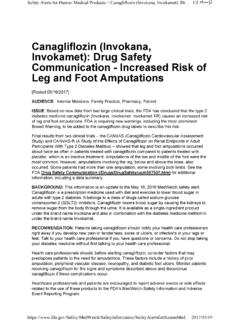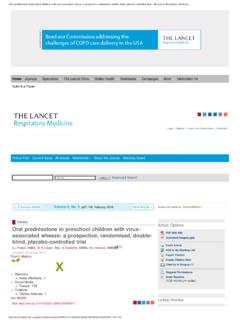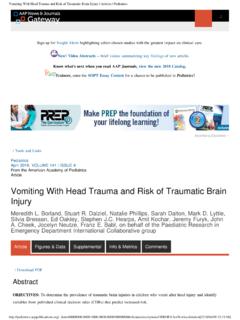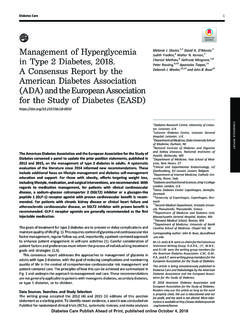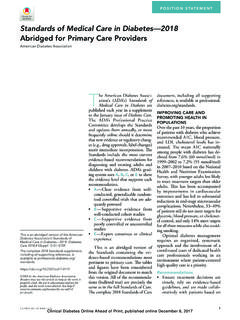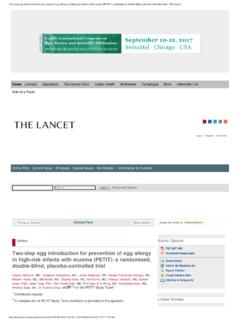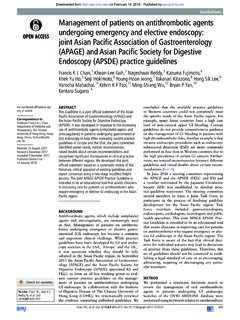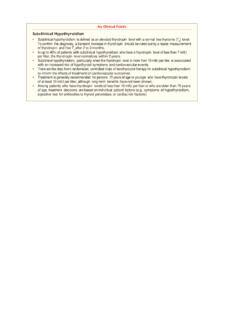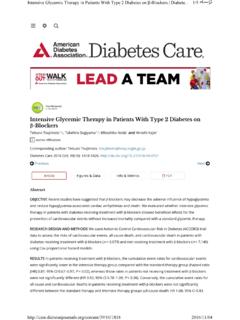Transcription of Coronary Heart Disease and Stroke Meta-analysis of Egg ...
1 Full Terms & Conditions of access and use can be found by: [ ]Date: 10 December 2016, At: 18:05 Journal of the American College of NutritionISSN: 0731-5724 (Print) 1541-1087 (Online) Journal homepage: of Egg Consumption and Risk ofCoronary Heart Disease and StrokeDominik D. Alexander PhD MSPH, Paula E. Miller MPH, Ashley J. Vargas PhDMPH RDN, Douglas L. Weed MD PhD & Sarah S. Cohen PhDTo cite this article: Dominik D. Alexander PhD MSPH, Paula E. Miller MPH, Ashley J. VargasPhD MPH RDN, Douglas L. Weed MD PhD & Sarah S. Cohen PhD (2016) Meta-analysis of EggConsumption and Risk of Coronary Heart Disease and Stroke , Journal of the American Collegeof Nutrition, 35:8, 704-716, DOI: link to this article: supplementary material Published online: 06 Oct your article to this journal Article views: 3079 View related articles View Crossmark dataReviewMeta-analysis of Egg Consumption and Risk ofCoronary Heart Disease and StrokeDominik D.
2 Alexander, PhD, MSPH, Paula E. Miller, MPH, Ashley J. Vargas, PhD, MPH, RDN, Douglas L. Weed, MD, PhD,Sarah S. Cohen, PhDEpidStat Institute, Ann Arbor, Michigan ( , , , ); Seattle, Washington ( ); DLW Consulting Services,Salt Lake City, Utah ( )Key words: epidemiology, Meta-analysis , diet, Coronary Heart Disease , strokeThe possible relationship between dietary cholesterol and cardiac outcomes has been scrutinized for , recent reviews of the literature have suggested that dietary cholesterol is not a nutrient of concern. Thus,we conducted a Meta-analysis of egg intake (a significant contributor to dietary cholesterol) and risk of coronaryheart Disease (CHD) and Stroke . A comprehensive literature search was conducted through August 2015 to identifyprospective cohort studies that reported risk estimates for egg consumption in association with CHD or Meta-analysis was used to generate summary relative risk estimates (SRREs) for high vs low intakeand stratified intake dose response analyses.
3 Heterogeneity was examined in subgroups where sensitivity and metaregression analyses were conducted based on increasing egg intake. A 12% decreased risk ( , 95%confidence interval [CI], ) of Stroke was observed in the Meta-analysis of 7 studies of egg intake (high vslow; generally 1/d vs<2/wk), with little heterogeneity ( , ). A nonstatistically significant SRREof (95% CI, , , ) was observed in the Meta-analysis of 7 studies of eggconsumption and CHD. No clear dose response trends were apparent in the stratified intake meta-analyses or themeta regression analyses. Based on the results of this Meta-analysis , consumption of up to one egg daily maycontribute to a decreased risk of total Stroke , and daily egg intake does not appear to be associated with risk of Teaching Points: The role of egg consumption in the risk of Stroke and Coronary Heart Disease has come under scrutiny overmany years.
4 A comprehensive Meta-analysis of prospective cohort studies that reported risk estimates for eggconsumption in association with CHD or Stroke was performed on the peer-reviewed epidemiologicliterature through August 2015. Overall, summary associations indicate that intake of up to 1 egg daily may be associated with reducedrisk of total Stroke . Overall, summary associations show no clear association between egg intake and increased or decreasedrisk of CHD. Eggs are a relatively low-cost and nutrient-dense whole food that provides a valuable source of protein,essential fatty acids, antioxidants, choline, vitamins, and potential relationship between dietary cholesterol andrisk of cardiovascular Disease (CVD) has been debated for dec-ades. Early studies reported strong correlations betweencholesterol intake and Heart Disease ; however, recently pub-lished studies have shown no or little effect between dietarycholesterol and cardiac outcomes or markers of CVD risk.
5 As aresult, the scientific community has acknowledged that otherdietary covariates may impact Heart Disease more than dietaryAddress correspondence to: Dominik D. Alexander, PhD, MSPH, Principal Epidemiologist, EpidStat Institute, 2100 Commonwealth Blvd, Suite 203, AnnArbor, MI48105. E-mail: versions of one or more of the figures in the article can be found online at materials for the article can be accessed on the publisher s of the American College of Nutrition, Vol. 35, No. 8, 704 716 (2016) American College of NutritionPublished by Taylor & Francis Group, LLCcholesterol [1]. Historically, dietary cholesterol recommenda-tions have ranged from<300 mg/d for healthy individuals and<200 mg/d for those at high risk of CVD [1]. Specifically, theAmerican Heart Association recommended that healthy adultslimit dietary cholesterol intake to no more than 300 mg/d onaverage [2,3].
6 Consistent with this recommendation, the Die-tary Guidelines for Americans formerly recommended thatcholesterol intake should not exceed 300 mg/d [4]. However,the 2015 Dietary Guidelines for Americans scientific advisorycommittee stated that they will not bring forward this recom-mendation because available evidence shows no appreciablerelationship between consumption of dietary cholesterol andserum cholesterol and that cholesterol is not a nutrient ofconcern for overconsumption [5]. In 2 2014 reports, theAmerican College of Cardiology/American Heart AssociationTask Force on Practice Guidelines concluded that there isinsufficient evidence to determine whether lowering dietarycholesterol reduces low-density lipoprotein cholesterol, and norecommendations were made to reduce dietary cholesterol tospecific levels [6,7].
7 Similarly, the European Guidelines onCardiovascular Disease Prevention in Clinical Practice(Version 2012) report concluded that the impact of dietarycholesterol on serum cholesterol levels is weak compared withthat of the fatty acid composition of the diet [8, p1665]. Thus,the European working group also did not recommend specificguidance on the intake of dietary cholesterol [8].Eggs are a common source of dietary cholesterol, with a singlelarge egg containing approximately 186 mg of cholesterol [9].Eggs also contain protein, essential fatty acids, antioxidants, cho-line, vitamins, and minerals [10,11] and, as such, are a nutrient-dense whole food that should be evaluated based on total con-sumption rather than specific constituents, such as there has been concern that regular egg intake may beassociated with risk of CVD due tocholesterol content, most epi-demiologic studies have not reported increased risks of CVD, cor-onary Heart Disease (CHD), or Stroke .
8 In a recent Meta-analysis ofcohort studies of egg consumption,no statistically significantsummary associations were reported for total CVD (hazard ratio[HR] , 95% confidence interval [CI], ), ischemicheart Disease ( , 95% CI, ), or Stroke ( , 95% CI, ) based on high vs low intake levels,although all associations were in the inverse direction [12]. Fur-ther, in a dose response Meta-analysis , no evidence of a curvilin-ear association was observed between egg consumption and riskof Coronary Heart Disease and Stroke using restricted cubic splinemethodology and, again, the trendswere in the inverse direction.[13]. Since these meta-analyses were published, new cohort stud-ies of egg intake and CVD, CHD, and Stroke have been publishedbased on analyses of the Nurses Health Study [14], Health Pro-fessionals Follow-up Study [14], Northern Manhattan Study[10], and Atherosclerosis Risk in Communities Study [15].
9 The objectives of the present study were to conduct anupdated, comprehensive Meta-analysis to (1) estimatesummary associations between egg consumption and CHD andstroke risk based on high vs low intakes; (2) conduct stratifiedintake dose response analyses; (3) conduct dose responsemeta regression analyses based on increasing levels of eggintake; (4) conduct subgroup and sensitivity analyses by impor-tant study characteristics to identify potential sources of hetero-geneity and to estimate patterns of risk by study factors; (5)estimate the influence of each cohort on the overall effect size;and (6) evaluate the likelihood for publication followed the Preferred Reporting Items for SystematicReviews and Meta-Analyses guidelines for this systematicreview and Meta-analysis [16] (see supplementary material forPreferred Reporting Items for Systematic Reviews and Meta-Analyses checklist).
10 Literature SearchSystematic literature searches in the PubMed bibliographicdatabase were performed to identify articles on egg consump-tion and cardiovascular Disease endpoints (focusing on CHD)and Stroke . Searches were conducted through August searches combined MESH terms (dietary cholesterol, cor-onary Heart Disease , ischemic Heart Disease , Coronary arterydisease, myocardial infarction, Heart failure, cerebrovasculardisorder, Stroke , cardiovascular Disease ) with text terms (eggs,egg consumption, egg intake, cholesterol, and dietary choles-terol). Supplementary literature searches included searchingEMBASE and screening reference lists from all relevant stud-ies, review articles, meta-analyses, and Cochrane Collabora-tion reports. In particular, we reviewed the references includedin the recent Meta-analysis by Shin and colleagues [12].
